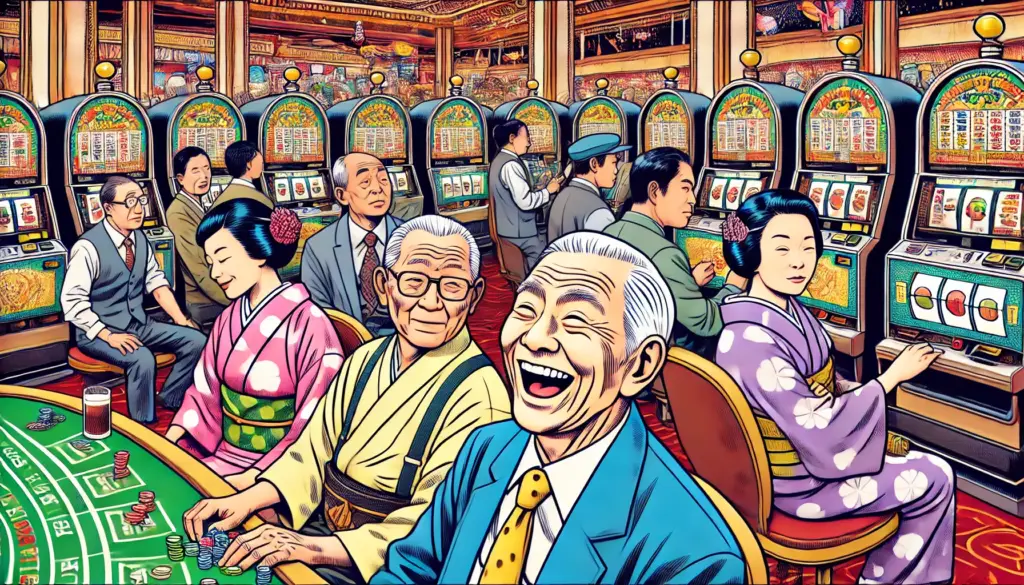
🃏 In Japan, gambling has long existed in a legal gray area. Pachinko parlors operate with a clever workaround, horse racing remains a popular pastime, and now—thanks to the 2016 Integrated Resort (IR) Promotion Act—the country is moving toward full-scale casino legalization. Yet, in a seemingly contradictory twist, young people are increasingly being arrested or warned for participating in online casinos.
As of July 28, 2025, Japan finds itself at a cultural and legal crossroads. On one side, politicians are pouring billions of yen and immense political capital into turning Osaka into a glitzy casino town. On the other, police forces are intensifying their campaigns against online gambling—raiding users, issuing warnings, and even arresting influencers who promote or participate in illegal online casinos. This glaring contradiction reveals a deeper, unresolved ethical dilemma at the heart of Japanese society.
🎰 Osaka’s Dream: Building a Casino Town
The idea of building a casino resort in Osaka is not new. It has been debated for over two decades. However, with the IR Implementation Act gaining full traction in recent years, the dream is now becoming a concrete reality.
Key elements of the Osaka IR plan:
- A large-scale casino complex in Yumeshima, an artificial island in Osaka Bay
- Integration with hotels, shopping malls, and convention centers
- Completion targeted for late 2029 or early 2030
- Backed by major political figures and global casino operators like MGM Resorts
Proponents claim this project will:
- Revitalize the local economy
- Create tens of thousands of jobs
- Boost tourism post-COVID
- Generate billions in tax revenue
Indeed, major political figures from the Liberal Democratic Party (LDP) and Osaka Ishin no Kai have thrown their support behind the plan, making it a centerpiece of regional development policy.
💻 Meanwhile, Online Gambling is Under Fire
In stark contrast to the casino-building enthusiasm, Japanese police have dramatically stepped up crackdowns on online gambling.
Recent developments include:
- Police departments in Tokyo, Osaka, and Fukuoka issuing multiple public warnings about the illegality of online casinos
- Arrests of celebrities, YouTubers, and even Twitch streamers who either played or promoted foreign casino sites
- News reports detailing university students being fined or detained for accessing international gambling websites using VPNs
Japan’s Criminal Code currently prohibits all unauthorized gambling activities. While casinos in IR zones are legally sanctioned and closely regulated, online casinos—especially those hosted overseas—are explicitly outlawed. This has not stopped their growth, as younger generations seek out thrill and quick cash online, often unaware of the legal implications.
⚖️ The Contradiction: Offline Legal, Online Illegal?
At the heart of this issue lies an uncomfortable contradiction:
- Offline Casinos = Legal (if sanctioned by the government)
- Online Casinos = Illegal (even if licensed overseas)
Why is this the case?
The government justifies the IR policy by arguing it can regulate addiction, crime, and money laundering in a controlled, physical environment. Meanwhile, online casinos are seen as uncontrollable and easily accessible—thus more dangerous, especially to youth.
But here’s the problem: from a moral standpoint, both forms of gambling involve risk, addiction, and the potential to destroy lives. If the government deems one as a source of economic growth and another as a crime, the line becomes blurred. This inconsistency is not lost on the public.
🧠 Do People Understand the Ethical Paradox?
Surprisingly, most people do not seem to question the contradiction.
Possible reasons include:
- Legal Illiteracy: Many are unaware that even accessing an online casino from Japan is illegal.
- Media Framing: Traditional media often paints IR projects as “development” and online gambling as “delinquency.”
- Public Apathy: The public is used to ambiguous policies (like the pachinko loophole) and doesn’t push back.
- Selective Enforcement: Authorities appear more interested in symbolic crackdowns than systemic reform.
This lack of discourse is dangerous. It creates space for biased policing and selective justice. It also undermines the credibility of rule of law, which should ideally be consistent, regardless of whether chips are stacked on a Vegas-style table or clicked on a smartphone screen.
🤳 The Role of Influencers and Celebrities
Several Japanese influencers and celebrities have unwittingly (or knowingly) stepped into legal hot water.
- A YouTuber boasting about winnings from an online casino drew police attention and public backlash
- A former idol group member was caught promoting affiliate links to gambling platforms
- Even underground hip-hop artists have been targeted for lyrics referencing crypto-based gambling apps
Their involvement underscores a generational divide: older lawmakers push for state-sanctioned “safe” gambling, while digital-native youth explore the global, decentralized casino market—often without understanding its legality.
🔮 What’s Next? A Call for Coherent Reform
If Japan wants to move forward with legalized gambling in a fair and transparent way, it must:
- Clarify Laws: Make it easier for the public to understand what is and isn’t legal.
- Standardize Policy: Apply similar ethical standards to both physical and online gambling.
- Educate Youth: Implement school-based programs on the risks and legality of gambling.
- Regulate Online Platforms: Explore ways to license or at least monitor overseas casinos operating in Japan.
Most importantly, Japan must stop pretending that government-sanctioned gambling is fundamentally different from its online counterpart in terms of impact. A consistent, ethical stance is essential.
🧩 Final Thoughts: A Society of Contradictions
Japan is a country that prides itself on harmony and consistency, yet when it comes to gambling policy, the logic falls apart. The government says it’s okay to bet inside a billion-yen resort, but criminal if done from a bedroom. This double standard is not just confusing—it’s ethically indefensible.
Until Japanese society confronts this contradiction head-on, it will continue to criminalize the young while celebrating political ribbon-cutting ceremonies in glitzy casino lobbies. The sooner this changes, the better.



















































